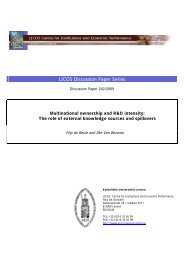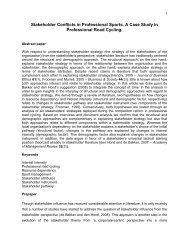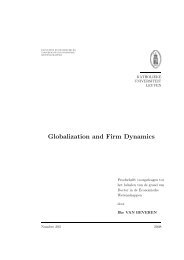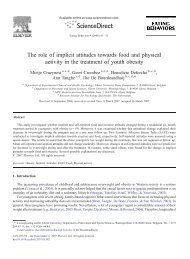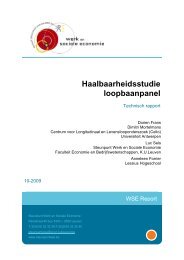View/Open - Lirias@Lessius
View/Open - Lirias@Lessius
View/Open - Lirias@Lessius
You also want an ePaper? Increase the reach of your titles
YUMPU automatically turns print PDFs into web optimized ePapers that Google loves.
Cyprus: The Belgian ‘Tool Box’ Revisited<br />
people (in spite of UN resolutions that<br />
the relationship of the two communities<br />
is not one of majority and minority but<br />
one of political equality), and without<br />
the settlement of the long-standing Cyprus<br />
problem, has since May 2004 added<br />
to the long list of divisive political and legal obstacles in the way of the establishment<br />
of a postmodern partnership state on the Island.<br />
Power to Sign International Treaties<br />
Belgium is a country where an<br />
overarching political nation and<br />
two cultural/economic nations<br />
co-exist<br />
Since the 1993 reform, the Belgian system has extended the internal autonomy<br />
of the federated entities in their areas of competence into the international arena,<br />
endorsed by the Constitution as the principle of in foro interno, in foro externo. Consequently,<br />
the regions and communities execute their competences both domestically<br />
and internationally. International treaties falling into the exclusive jurisdiction<br />
of a community or region are thus concluded by its government and approved by<br />
its council (or parliament). The Federal Cabinet can object to the provisions of a<br />
draft treaty, in which case the issue is taken up in the Inter-Ministerial Conference<br />
on Foreign Policy (ICFP) constituted by the relevant ministers of the federated and<br />
federal governments and where decisions are reached by consensus. The exclusive<br />
and predominant competences of the communities and regions are quite vast and<br />
extend into cultural affairs, education, the use of languages, land use and planning,<br />
environment and water policy, rural re-development and nature conservation, housing,<br />
agricultural policy, economic policy, external trade, energy policy, subordinate<br />
authorities, employment policy, public works, and transportation.<br />
The two sides in Cyprus do not see eye to eye on this issue either. The Turkish<br />
Cypriot position is to apply the current Belgian experience (ius tractatis) in this<br />
instance as well while the Greek Cypriot position is more reserved regarding the<br />
powers of constituent states.<br />
The result is that one has, as Bahcheli and Noel write, “two oddly distorted versions<br />
of Belgian federalism […] Hence, for example, the Turkish Cypriot leader’s<br />
selective emphasis on Article 167 of the Belgian constitution, which establishes<br />
the right of the constituent regions to play an international role that includes even<br />
treaty-making power in matters falling under their jurisdiction. Hence also the<br />
Greek leader’s emphasis on the fact that only the Belgian federal government has<br />
legal status in international law […] and that in the councils of the EU, Belgium is<br />
required to ‘speak with one voice.’” 12<br />
123



